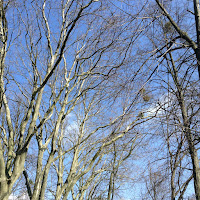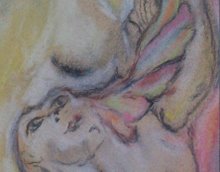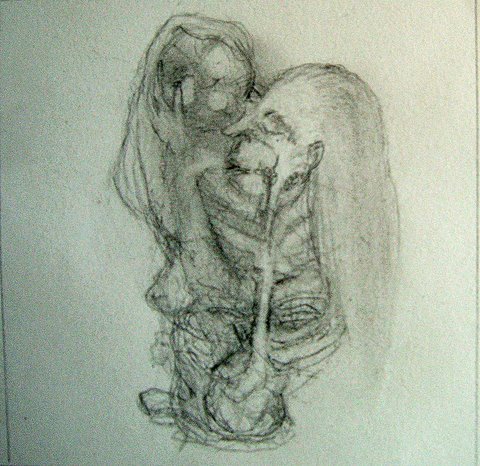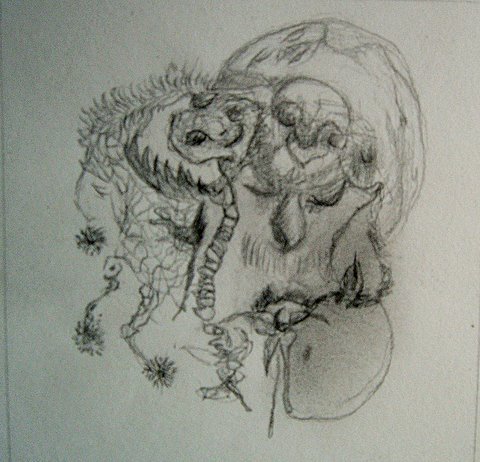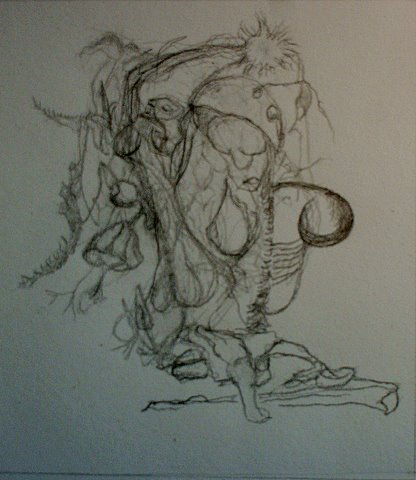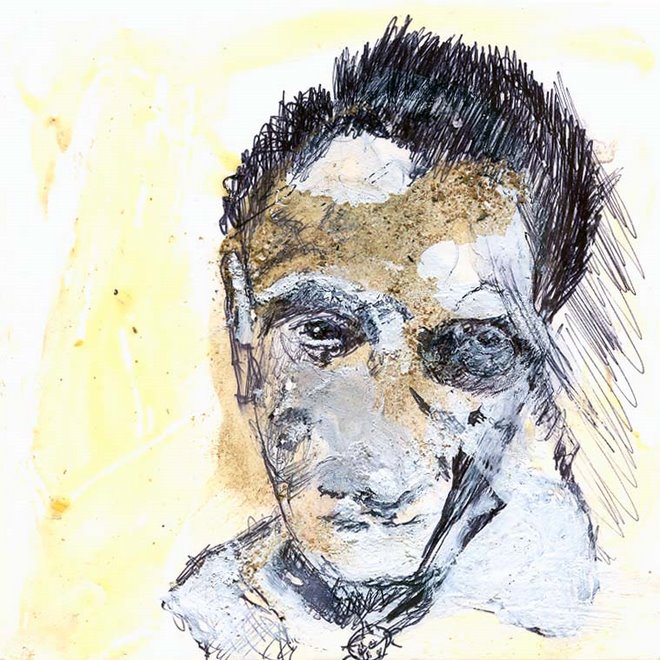Incipit, the first of the
Installments in
Being Jeff Gburek, the life to death entropic attenuation myth of the material being of the person I was, or have been so far; and which I, while continuing to be the writing appendage of the aforementioned, draw from the residues of my internal
Mnemonic Productions, presenting, nevertheless, Something Like A Life I Keep Trying To Lead But Instead Get Led Into or Misled About... this installment, on the disillusion of social poets & social poetry... set at the tail-end of the Reagan/Thatcher era, the tale ending not there.. but in the Ouroboric slipstream of the same Neo-Conservative build-up to contemporary ruins --
A life story, how it hurts (sometimes) to not be able to move, (or how it feels good to wander aimlessly) or to feel snared by low birth, high testosterone, mercurial passions, ideals and a morality that prevent one from being Machiavellian enough to be ruthless, & yet how staying behind others moving sluggishly, feels like slavery, how sometimes this all bursts open and flowers everywhere make one forget what we need not remember. My story is for anyone a bit like me who never wanted to be a hero but got stuck with the role defending himself against the onslaughts of irascible unprincipled and nefarious jerks, idiot demons, bad luck (and good luck leading to bad situations, heraclitean topsy turvey). The arch enemy is usually capitalism, for lack of a better term. War, poverty & profit from the earth's natural resources that no one actually owns but actually does anyway. I started out nobody and then created the various versions of myself some people encountered and chose to know as versions of themselves, inescapable shredded fragments of the narcissus flower, that remain pure, friendly and lovely communions, until turned into broken mirrors that cut every which way but loose in the battle for destroying the other that one no longer allows to speak.
"...some people people work very hard
but still they never get it right...
well, I'm beginning to see the light..."
Let me speak. Let me self-mythologize a bit, here and now, so there will be a history written by a defeated person for once. Let me tell you a story about a young poet who sought the guidance of an elder poet in a distant land far from his place of birth.
The story will use the names of many real people whose names some of you may know and who resemble actual persons living and dead or undecided. The story has not been changed to make me look better (insert your critical hyper-links here ________ ) and in fact I will only paint myself in the colors I know how to use from the way I experience my own motives. I will attempt to be excruciatingly clear. The first chapter shall be called
"The Duncan Affair". It is a myth in the sense that it focuses on the idea of being something or someone and relating to people in (social) positions in life that are imaginary, out of reach, even sometimes collectively recognizable figures of social importance, but for the young person just waking into the world, the figure is an imaginary one, like a Davd Bowie (the man with many faces), who maybe, for example, embodies more substance for to some people than their own peers.
"here we go again, acting a part again..."
The name
Robert Duncan creates often a great stir of emotions both negative and positive in those who hear the name pronounced. Among certain people, any praise of Robert Duncan for his achievements as a poet, teacher, thinker, speaker, generates no little amount of disgust or resentment, especially if you have been the butt of one of his tirades or ugly turns. Let me tell you I have been on both sides. Disappointed, humiliated, shocked, disillusioned, deeply pissed-off & also thrilled, inspired, awe-struck, humbled, educated, supported & confirmed in my beliefs. I know people who loved him unconditionally even though I never did thoroughly, being at heart an anarchist, & un-leadable, what the New Age people call Sigma transiting Omega personality type (barf!). I wanted to perhaps embrace him but could not entirely while being unable to deny (by the evidence of my own senses) his vast knowledge and obvious wealth of experience and when certain friends (who usually, along with not liking his personality, don't have an ear for his poetry) who complain about his grand-standing, cutesy performativity -- working his audience, with that perfect conversational balance between jester, sprinkling in profanities (with maybe passive-aggressive self-deprecatory/self-bloating tendencies), and the serious lecturer, serious message, with verbatim quotes flying, catering to a public which, after many years, he knew quite well -- we can maybe see diva in effect. But also, it must be said, he was an orator, a keeper of the flame of oral traditions, a story-teller, a bard. And above all, Robert Duncan, I think we can say, was a community-oriented person. He didn't need to teach because he had a trust-fund but he taught anyway (maybe this is a myth). He went to the readings of other poets in the community. And even those of us who hoarded books and haunted the stacks of libraries and seemingly read most widely found ourselves being given further information, names, titles and ideas from his readings and quick imagination and versatile speech skills that let arrows fly often straight into the heart of what you were thinking. He had in a certain sense a kind of clairvoyance that many of his generation did seem to have. He did then, when he was indeed so, and remains to me now, a figure from another century. I remember finding the San Francisco Chronicle on the door-step with his face on the front-page on February 3, 1988. and I cried out loud. My flat-mate of the time, cracked his room door, said, hey, what's wrong? I said, Robert Duncan. he died. Mike, his name was Mike, slammed the door. I heard him say to his girl-friend, Amanda, " Oh why is he waking people up?" Mike too had been a student at the New College with me and had learned to dislike Robert Duncan. Such is our life.
One cold Buffalo winter day of either 1984, I took a plane to San Francisco. In another chapter about Buffalo (The Bridge I Wanted Cross Ran Right Over Me), I will explain the impact of Jack Clarke upon my life but in short, I decided the most important thing in life was to get closer to these minds who had something, anything to do with Black Mountain College. Mythology pure and simple: I wanted in fact to go to Black Mountain but that was already only myth that we called already the history of education in the USA. Being a poet, like being a musician, back then, was seen as either ludic or ludicrous behavior. But my head was full of muthologems. The fact was I had been in two near fatal car accidents in Buffalo with reckless drivers (my first meeting with the idea that death is linked to "place" --that death can reach you, if you don't know when to move out of reach) and been apprehended by the police a demonstrations against the funding of the Contras and for rushing the limousine of Ronald Reagan (if one can ever find the archives of SUNYAB's student paper called The Spectrum, you should find a photo of a cop twisting my arm behind and slapping on the cuffs. I spent the afternoon in a holding cell and they released me without charges. Because I had been photographed. The secret service now had me on record. I achieved a degree of notoriety in the anarchist community but there was nothing in Buffalo for me. No love interest and nothing left to do but watch my ideals crumble into conformity or stay chained with the Tapeworm gang in the squats. Although it was Jack Clarke and Bob Creeley who fed me the intellectual line I bit on hard to yank me out of the swamp there, it was the anarchist squatters and their community connection in the Bay Area that made the move to seek out Robert Duncan thinkable as doable. And so I dressed up my mind and body in myth, closed my bank account, formally --a procedure which demanded I meet with a higher official, some Kafka or other, and sign the papers to close out the account -- dramatically telling the bank's vice president that I am withdrawing my money
because, your bank funds Apartheid in South Africa (she blinked several times, I wondered if it was a tic or not) and I went West with 600 bucks, back-pack of clothes, some Levertov and Olson/Creeley Letters, Bending the Bow). On the plane I met someone who was getting picked up at SFO and going to Berkeley where I went looking for a collective house on Ashby Avenue that I couldn't find for a few days. Thusly I encountered homelessly the situation at People's Park and met some traveling punk girls who let me share the roof-top of a dorm they'd found to be secluded and safe, accessible by fire-escape ladder. There I saw the stars for the first day of my life from the other side of the North American continent and while astronomy tells us there are just as many stars on the East Coast, I had never seen so many, in one place, in one mind. So many lost givers of light still shining in my eyes. It wasn't as a warm as one might expect but I would not die of frost-bite.
Eventually I hooked up with Ashby House and stayed at first on the couch in the back-room while looking for approval to enter the San Francisco squat, which location was not shared openly. Then I was befriended by George who allowed me to stay as an uninvited extra house-mate, with the assumption that it was temporary, although George cut me some keys. With luck, no one would complain that I was crashing their party. I and George bonded over what we called The Movement and he shared information with me about the hacking community and the other people organizing the shanty towns in Sproul Plaza. I had just enough time to get oriented and found myself next crashing the New College, where I'd heard it was cool, to sit in, as it was a tradition, to keep lectures open to the community. By that time, I had culled together a sheaf of type-scripted poems, modest but coherent lyrics, most of which I have forgotten, although fragments come to mind. Although I had been told it was not permitted to introduce your work at table during the Basic Elements of Poetics meeting, this round-table style lecture, with the whole core Poetics faculty, there was a moment in the first meeting where, for some reason, I was bidden to speak and said well, I have nothing to say right now but I have these poems. So I read, with a lump in my throat, hands trembling somewhat.
The only one I recall
About
an eye
around
a corner
in a mouth
--so to say --
(here my memory of the verse is faulty
in a few days, I should have
the files from archives)
Was it love?
near that bend
Then gone
And I suppose it was at the end of my reading, with this poem, that I saw one of Robert Duncan's eyes looking at me with a peculiar sense of poignancy. As most of us who have read his poems with care know, there is a great sinking sense of loss and mourning in the works and perhaps this renders them insufferably maudlin. Perhaps after some time those who read him overmuch or felt his stinger during his tantrums felt less inclined towards sympathy or compassion. After I concluded my short recitation, it was rather amazing to hear the poet Robert Duncan commenting on my work after having just heard it for the first time. I was stunned. Never had anyone really seen straight into the writing as he had. Then he looked at me with one of those eyes. (I suppose this was one of the hypnotic aspects of his person, he was perhaps also not looking at you. This left you guessing, whereas with other people, you know when the gaze is direct, you return it or shift your eyes away, obeying ancient instincts). In those times, I had shaved the hair away from one side of my head around the ear, because I thought mohawk style wasn't my kind of thing. While he regarded me he announced, apropos of nothing (I thought) :
well, you know, Schoenberg said that in his music the asymmetry was just as important as the symmetry. It took me a while to get the joke. I suppose other people might have felt insulted. On the way back to East Bay on the BART train one of the people in the class saw me and introduced himself as Hal (Halliday Dresser) who would become a major friend in my life. We met later to play guitars at a flat in North Beach he had sublet from Brion Gysin.
The theme of my poem of course brings up an image of seeking for or imagining the look of love (or more aptly, that it disappears). The myth of love as entering through the eye. Little did I know my little eye in the poems was looking out or being looked into, that this look could get you in trouble, that looking out one's window in some cultures is considered an invitation to look inside . That the look that was sexually promiscuous was not new particularly but the cultural context had shifted. Duncan had a certain reputation as a dandy, appearing in the hyper-sexualized mythos of the Anais Nin circles. Certainly he took what he could get, as the song goes. Recently I've read that Duncan has been characterized as predatory, that there's even a biography written that seems to support this concept from various angles. Difficult to know what predatory means exactly since the Duncan I met was an old man, attached to a IV drip, and even if he should become infatuated with me, I wasn't doing guys. While San Francisco and California in general had the reputation of being sex-positive-ville these were also the times of the greatest number of AIDS related deaths and I had other fish to fry. The first months after my arrival in the Bay Area coincided with the mounting tensions in Anti-Apartheid movement in Berkeley.
UC Berkeley Anti-Apartheid Movement
For the newbie in the Bay Area, reading Robert Duncan's Up-Rising, The Multiversity etc. during these times of student protest created a kind of time-warp. I was walking near Throckmorton Manor, all the old haunts, as if walking inside his poems (but none of the people in the movement knew him). And while it was clear that the U.S. had pulled troops out of Vietnam, the war behind the declared war that seems to only serve to nurture capital and the arms-industry rages on in various places and the excess guns get used by home-spun terrorists to shoot up high-schools in the present century, in the contemporary moment when I write these reflections and I wonder how we shall ever overcome all this. Duncan's break with Levertov over the nature of the impulses to war leave bitter tastes in the mouth even now. Was he correct in assuming, condemning even his own creativity as part of the unconscious rage for domination? If he is wrong then indeed he is guilty of a great exaggeration built upon the assumption that the Freudian Id knows not what it is doing and it is perhaps this error that allows his reading public to refer to such poems as having great significance. Perhaps they are hysterical or even a kind of black magic to keep the minds in fear, the paralyze the people. And yet, there is something evident in the culture we live in wherein drones are built to murder faceless alleged enemies of States we do not elect, because the corporations are not elected and they, despite everything we know about how they operate, continue to manipulate the moves of governments and militaries throughout the world without our consent; and while we are unable to hide from our impotence to change these conditions, we adopt other thought strategies and self-serving philosophies to cope. We crave escape. Yet the earth's most pristine and beautiful areas are being destroyed. Our paradise depleted in species diversity. We have critiques of capital and media and the conversion the internet to a control mechanism but we have no movement to preserve outdoor places to feel silence and nature's neutrality.
In the middle of a discussion Pound one day during a lecture Duncan breaks down, weeps and says
the spirit mends itself of it owns sins we hope one day... but Pound certainly must have suffered knowing that he had misled his people. These are the kinds of things one can't really forget. Maybe I heard him incorrectly. The scene from Kurosawa's film Dreams called the Tunnel springs to mind.
https://en.wikipedia.org/wiki/Dreams_(1990_film)
Pound, a misleader of poets, perhaps. Or Duncan himself, misleading himself and others?
Forever I will probably be unable to condemn properly or curse this man. I don't believe he was deliberately cruel to anyone. But my knowledge extends not so very far. And yet, I can aver that he slighted me and I felt rather unjustly criticized and that it hurt. It's taken some time to realize that we were experiencing Duncan in 1986 in phases of the dementia associated with his illness. This is what I recall. He hadn't appeared for lessons one whole semester already. By then I had become enrolled officially in New College Poetics program and I was happy to learn that Duncan would be back to teach a seminar on H.D. and it would focus on Trilogy. But something was amiss. There were too many people enrolled, 40 perhaps. It appeared that for reasons of preserving his health they would be forced to reduce the amount of students. Protests went around and no one seemed at happy about the need to trim attendance numbers. More tragically, the process of elimination took the form of a particularly bizarre ritual wherein we were to be judged fit for the table based upon our reading a passage from The Walls Do Not Fall and subsequent interview/grilling. I had the feeling like it was a mock contest set up to scare people away but it back-fired and I don't scare that easily anyway. The various people around the table read and Duncan commented variously and obviously I was nervous and concerned about what would happen despite my generally cavalier attitude. The book is passed around the room but I have my own copy. My canto turns out to be
An incident here and there,
And rails gone (for guns)
From your (and my) old town square:
mist and mist-grey, no colour,
still the Luxor bee, chick and hare
pursue unalterable purpose
in green, rose-red, lapis;
they continue to prophesy
from the stone papyrus:
there, as here, ruin opens
the tomb, the temple; enter,
there as here, there are no doors;
the shrine lies open to the sky,
the rain falls, here, there
sand drifts; eternity endures:
ruin everywhere, yet as the fallen roof
leaves the sealed room
open to the air,
so, through our desolation,
thoughts stir, inspiration stalks us
through gloom.
He interrupts here
there, again, the stranger
I almost knew
Hard to hear his words
slightly slurry
they curl out --
it's
as if the distance
cannot be bridged by sight,
his head sunk
into his own book,
it is not a post-
modern poem, he says
this is not projective
versification...
I don't remember the rest because of course my face's aflame, struggling to bear up a man, and yes it's rather true, I am student, after all, I guess I had no clue how to truly strut out her stuff, I swallow, letting it flow over me. So, who knows what will happen.
It was on the next meeting we learned what will happen and he read down the list of people.
Coming to the name Gburek, he said
"bumped"
I should have told him off or launched into a defense saying I had in fact come long way to apply for audience in the court before this... King.
But by then, I had discovered a vita nuova living in San Francisco. Not always perfect but freshly scented let's say. Eucalyptus. I took Meltzer's Kabbalah course and Diane DiPrima's Hidden Religions. The Pacific Ocean, the Mission District, City Lights. There was a lot going on around us. Susan Howe came to lecture and read from Articulations of Sound Forms in Time. One of the first truly "musical" readings I ever witnessed (because of the silences). Creeley came to read and Bob Kaufman sat on a couch. H.D. Moe passed around word salads of great delicacy. Victor Hernandez Cruz. Leslie Scalapino. Poets were everywhere everyone was writing something. I published the first editions of Aql magazine. We did readings. There were concerts everywhere (Sun Ra? 6 times!) and woke up one morning and went to Point Reyes an slept our on a cliff over the Pacific to watch the stars turn for no other reason other than I could just do that. This time they danced and formed into figures of totemic animals and ludic or ludicrous names until I woke up just slightly chilled in my sleeping bag with the surf crashing somewhere below me.
Coda.
Years later, after I had done some of the things mentioned just above, then left the USA to study in Italy for 2 years, I passed through to Buffalo on my journey back to SF where I should've written my thesis. I was delighted to find Susan Howe had accepted a teaching position at SUNY@B and I dropped into her seminar on the works of the poet H.D. The first person I saw in the room before Susan had arrived was Elizabeth Willis. When we read aloud the passage from The Walls Do Not Fall, the exact same passage I had read in front of Robert Duncan almost 10 years before fell to me that day. Resist superstition, not the mysteries. Somehow, I managed to read it without any stumbling and made my comments & observations which were associated with noticing some strange associations with the Grail Myth, some way of reading that was completely esoteric, perhaps, qabbalistic (I will explain my exegesis in another post one day), not obvious, but not ridiculed by anyone in the room, the others seemed intrigued. I don't recall why but I felt I understood the poem. But I am sure that this silent feeling that one understands is not enough for the present world. This world of the Canonic Poetry and Poetry Wars wants noise and conflict of disagreement, misunderstanding, the rage of assessment. Either that, or, there really is a deep flaw in the vessel of poetry itself, that Grail is Gone, and can carry nothing inside of it without the slow leak of meaning being lost as the commentary dissipates, drains into social disorder. The law in the flaw of the bowl of crystal cries out the wind cries Mary there is no result
End Note: This writing was triggered by the recent controversial exchanges between Nathaniel Mackey and Barret Watten which brought my attention this youtube upload of a lecture tape on the work of Louis Zukofsky (1978!). It was hearing Robert's voice again and paying close attention to the strange social dynamics surrounding the presentation by Barret Watten that allowed me to contemplate my own experience from many years ago. Listen, carefully, here:
https://www.youtube.com/watch?v=6HwPtByxxzs&t=5517s
"In order to write well about something, one shouldn't be interested in
it any longer. To express an idea with due circumspection, one must have
relegated it wholly to one's past; one must no longer be preoccupied
with it." -- F. Schlegel, fragmentarian
"sometimes the muse has something to say and sometimes the muse just has to say something"
-- Robert Duncan


























